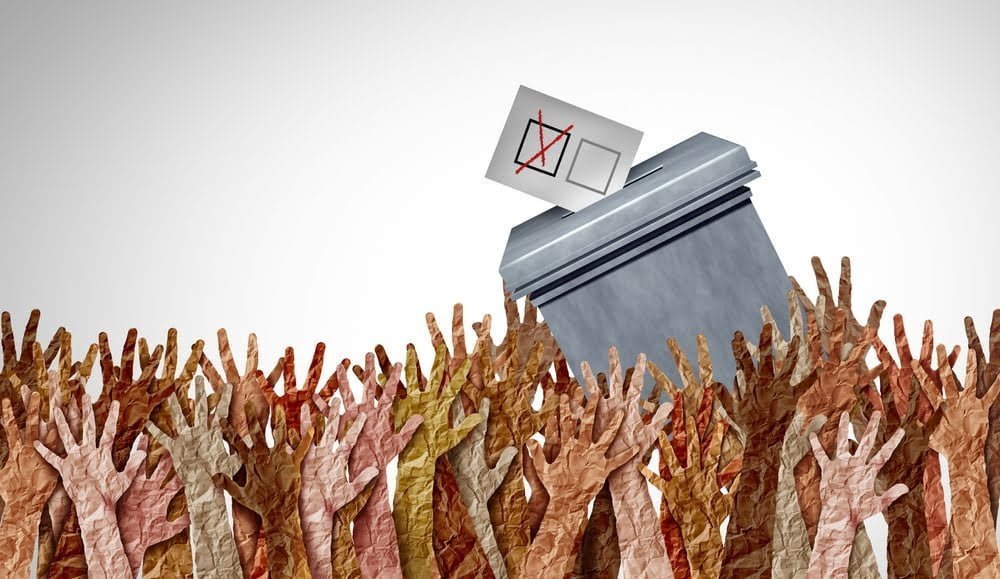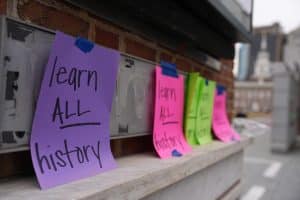Voting rights organizations in Pennsylvania are working to increase voter turnout and expand voting rights through advocacy and education.
Amid ongoing attacks on democracy and the state’s electoral process, groups like Common Cause Pennsylvania and the League of Women Voters of Pennsylvania are focused on expanding access to the ballot and ensuring that voters are well-informed and engaged in local elections.
“Voting affects every part of our lives, from the roads we drive on, to the cost of groceries, to rights to information,” Susan Gobreski, the vice president of policy for the League of Women Voters of PA, told the Bucks County Beacon. “One of the things we work to do is make sure information about elections is really accessible for people. If voters have tools that they can use that don’t make them jump through hoops, that’s an important thing.”
One such tool is LWVPA’s Vote 411, which she says is “intended to educate voters about the mechanics of voting” and provide information about specific candidates running for office. On the website, voters can check the status of their voter registration, look up deadlines to request mail-in ballots, search for polling places in their district, and look up local candidates’ positions.
Emphasizing the importance of voting in Pennsylvania’s upcoming judicial elections in November, Gobreski encourages voters to learn about who’s running and what they stand for before casting a ballot. LWVPA also participates in voter registration drives and community events to help “build awareness around the upcoming elections.”
Similar to Vote 411, Common Cause PA’s Election Protection program allows voters to receive information about voter registration, polling places, and mail-in ballots, etc., by calling the 866-OUR-VOTE hotline. Voters can call the hotline if they run into a problem at the ballot box, as well.

[This article is part of U.S. Democracy Day, a nationwide collaborative on Sept. 15, the International Day of Democracy, in which news organizations cover how democracy works and the threats it faces. To learn more, visit usdemocracyday.org.]
According to Christina Hartman, Common Cause PA’s advisory board chair, the organization also shares “accurate and reliable information” about voting on social media, provides voters with tutorials on how to correctly fill out ballots, engages in voter outreach to register people to vote, and works with other organizations to educate “voters with disabilities and caregivers about their voting rights to make sure that everyone has access to the ballot.”
Hartman says that while educating voters can also help combat election misinformation and “distrust” in the system, it’s not enough for advocacy groups to demystify the voting process – the government must also step in. “If the public doesn’t have confidence in what the government is doing, then the government itself needs to be on that first line,” she added.
In addition to keeping voters informed, Common Cause PA is also working to make voting easier and more accessible to all voters and help elections run more smoothly. “It’s our job to monitor what’s going on vis-à-vis democracy,” Hartman told the Bucks County Beacon, which includes working with “folks in Harrisburg to help advocate for a more accessible democracy” for every Pennsylvanian and dispatching “lawyers throughout the state to make sure that voting laws are being respected.”
Hartman says that implementing automatic voter registration, pre-canvassing mail-in ballots, adjusting voter ID laws, and creating standards for post-election audits can all expand access to the ballot and help “voters feel reassured that their vote counted.”
LWVPA is also fighting for policies that make it easier to vote and register to vote, like automatic voter registration, pre-registering 17-year-olds, setting up drop boxes at satellite election offices, funding county elections offices, and increasing hours for voter services, while working to protect private voter information, as well. “We want to make sure that we’re utilizing the systems that we have and not trying to make things unnecessarily cumbersome for voters,” Gobreski said.
READ: Pennsylvanians Must Reject Restrictive Voter ID Laws
Another way to make voting more convenient, accessible, and equitable, she says, is to count undated mail-in ballots – a position the state Supreme Court ruled against last year following a lawsuit from the Republican National Committee. As a result, thousands of mail-in ballots were disqualified by county election officials, according to data from the PA State Department.
“Voters should not be disenfranchised because of a technical error,” Gobreski added. “We know when a ballot has been mailed out by the county and we know when it’s received. So it is effectively dated. A voter should not be excluded from having their voice counted because they made a small and not material mistake.”







